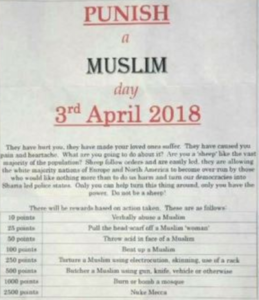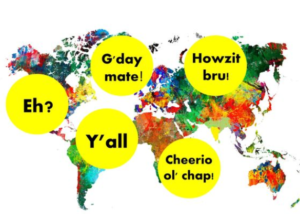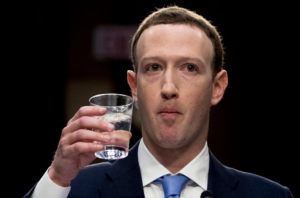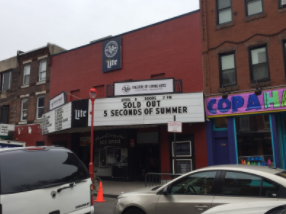Sanaa Scott-Wheeler
Staff Writer

In the weeks leading up to April 3rd, a flyer appeared on social media platforms advertising that day as “National Punish a Muslim Day.”
The flyer originated from the United Kingdom, and there were many acts of violence that occurred there. However, there was also great concern about attacks in the United States, especially due to Trump’s anti-Muslim policies., and
While no SLA students were attacked on this day, the event prompted reflection on the Muslim student body. “Punish A Muslim Day” is an extreme example of the microaggression and prejudice they deal with on a daily basis. Sophomore Naseem Hameid, who is American-born with family from Palestine, reported that ¨I thought national punish a Muslim day was stupid and when you think about it, it was disrespectful.”
¨People preach about respecting one another but at the same time will disrespect someone just like them¨.
Sophomore Koule Doucoure, who moved to Philadelphia from Niger in 2015, was also freaked out by the ¨event¨.
¨At first I was like, I´m not going to school. I told my cousin and she said ´you´re just going to give up your religion to something like this?´ When I came to school I was a little scared but I know the SLA community wouldn’t allow that to happen.¨
Most people find comfort in how diverse SLA is and that there is a little bit of everyone here so there are shared experiences. One of the biggest fears on April 3rd was alienation. For years, Muslims in Philadelphia have tried to coexist with everyone else, to only receive backlash.
Sophomore Samera Baksh, who is Bengali-American, told the story of her family’s first experiences in the United States as an example.
¨When my mom came to America a month later it was 9/11 so she would come out of the house and people would yell ¨oh you f*cking terrorist¨ ¨you muslim¨ ¨go back to your country¨ my mom would try to act American so she wouldn’t wear cultural clothes or the hijab — my mom is light skinned so she could pass as American.¨
When Hameid was asked if he had ever been discriminated against because of his religion, his response was ¨In middle school they would call me slurs like ´sand nigger´ ´bomber´ ´terrorist´¨.
Baksh has not been targeted in the same way, but still remains wary about what could happen. ¨I´ve never been scared here because I need to show people who I am, but I was scared for my mom wherever she goes,” Baksh said, “She takes my brother and I’m scared for them to hurt him too.¨
Freshman Ami Doumbia says ¨Usually most schools are afraid to talk about these types of things because they don´t wanna step on toes or because or because they don´t know enough, but that’s not helping anybody I believe that if SLA opened itself up to these types of conversations, like we do with other subjects (such as sexuality, race etc.) we can thrive more than we already do.¨
Many students reported that they had never or rarely experienced microaggression in the SLA community, however by giving the Muslim community at SLA more positive recognition, we can set an example for other schools in the city while making our school a safer Haven.



